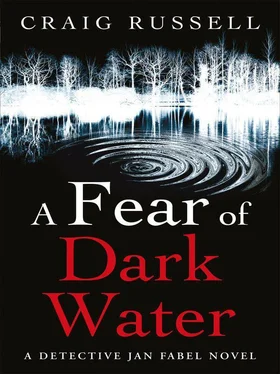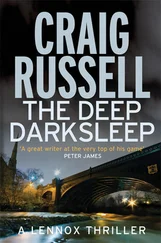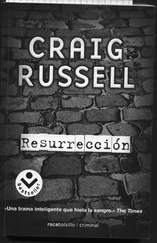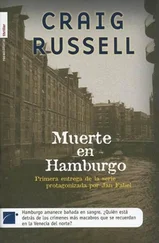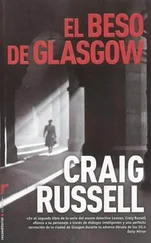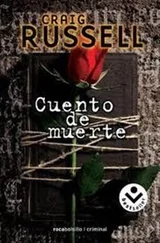Craig Russell - A fear of dark water
Здесь есть возможность читать онлайн «Craig Russell - A fear of dark water» весь текст электронной книги совершенно бесплатно (целиком полную версию без сокращений). В некоторых случаях можно слушать аудио, скачать через торрент в формате fb2 и присутствует краткое содержание. Жанр: Триллер, на английском языке. Описание произведения, (предисловие) а так же отзывы посетителей доступны на портале библиотеки ЛибКат.
- Название:A fear of dark water
- Автор:
- Жанр:
- Год:неизвестен
- ISBN:нет данных
- Рейтинг книги:5 / 5. Голосов: 1
-
Избранное:Добавить в избранное
- Отзывы:
-
Ваша оценка:
- 100
- 1
- 2
- 3
- 4
- 5
A fear of dark water: краткое содержание, описание и аннотация
Предлагаем к чтению аннотацию, описание, краткое содержание или предисловие (зависит от того, что написал сам автор книги «A fear of dark water»). Если вы не нашли необходимую информацию о книге — напишите в комментариях, мы постараемся отыскать её.
A fear of dark water — читать онлайн бесплатно полную книгу (весь текст) целиком
Ниже представлен текст книги, разбитый по страницам. Система сохранения места последней прочитанной страницы, позволяет с удобством читать онлайн бесплатно книгу «A fear of dark water», без необходимости каждый раз заново искать на чём Вы остановились. Поставьте закладку, и сможете в любой момент перейти на страницу, на которой закончили чтение.
Интервал:
Закладка:
‘You are a man of limited intellect, Fabel. And less imagination. I have no interest in continuing this conversation further.’ Wiegand started to stand up but Werner placed a persuasive hand on his shoulder.
‘You’re not going anywhere, Wiegand,’ said Fabel.
‘Then I think you need to make some specific charges,’ said Harmsen. Fabel could sense that she wished she had stuck to representing TV actresses with botched cosmetic surgery.
‘Do you believe in the afterlife?’ Fabel asked Wiegand, conversationally. ‘You know that Nikolai Fyodorov, way back in the nineteenth century, predicted that we would develop such computational power that we could bring almost anyone back to life?’
‘I do, yes.’
Fabel placed a grey USB memory stick on the table.
‘Do you know, I believe that there is someone alive in there. In that piece of plastic and silicon.’ He paused. Neither Wiegand nor Harmsen said anything, but Wiegand’s cold, hard little eyes remained fixed on the USB stick.
‘The person alive in here was a big man in our world. Literally. According to the pathologist, he weighed one hundred and eighty kilos. He was called Roman Kraxner and he was a deeply flawed individual. Like someone else I met — Niels Freese. But Roman’s main flaw was that he was a genius. And his particular talent was with computer technology. Do you know the name, Herr Wiegand?’
‘No, I don’t.’
‘That’s strange, because I believe you ordered his death. Or maybe you didn’t know his name, just that he was the person with Meliha Yazar’s cellphone. And whoever had that had to die, didn’t they? Anyway, Roman Kraxner lived more in the virtual world than in this. I have to admit that, had he lived, we would have wanted to talk to him about certain transactions of his, as well as the Klabautermann Virus, which, we believe, was Herr Kraxner’s creation.’
Fabel leaned forward, resting his elbows on the table. ‘You were right, Wiegand. I can’t go back in time to retrieve the sensitive files you had stored on certain computers and in your secret data-vault. All that noise and drama… the police raid, I mean… I admit that it’s all very crude. Now Roman was different. Roman was a lumbering mountain of a man in our world, but he could move gracefully and silently through networks and systems and firewalls. He paid the Pharos a visit, you know. You’re so proud of your technology and knowledge, but, compared to Roman, you’re a pedestrian. He passed through your security and copied file after file, incriminating document after incriminating document.’
Wiegand’s smile was more of a sneer. ‘Incriminating who?’ he asked. ‘If anyone at the Pharos Project has broken the law, then I condemn it wholeheartedly. But I wish you luck, a lot of luck, if you think you can pin anything on me personally.’
‘Yes, I admit that might be difficult. But we could have a pretty good try, and I’ve got enough evidence here to bring charges. Oh, by the way, I forgot to mention: Roman has sent copies of this to all the major national newspapers, television and, of course, to a dozen websites. My guess is that, as we speak, the word is spreading around the world. The Pharos Project is finished.’
‘I doubt that very much,’ said Wiegand. ‘And, like I say, you and I will be old men before you can get enough out of that…’ he pointed to the data stick, ‘… to get me anywhere near a prison.’
‘Maybe you’re right,’ said Fabel. He opened the folder again and placed a paperback book on the table next to the memory stick. It was the copy of The Judge and His Hangman by Friedrich Durrenmatt that they had found beside Meliha Yazar’s bed.
‘Have you ever read this?’ asked Fabel. Wiegand ignored him.
‘It’s a favourite of mine,’ said Fabel. ‘Philosophy for a policeman. The question being that if you can’t bring a criminal to justice for a crime they have committed, is it moral that they should be punished for a crime they did not commit?’
‘Again, Herr Fabel,’ said Harmsen, ‘if you have a point…’
‘I got it all wrong, yesterday, didn’t I? I was so sure I knew what it was that Meliha Yazar had found out,’ Fabel continued. ‘But I got it completely wrong. Well, not completely… I was right about the fact that she uncovered that Fottinger was the Network Killer. But, bad as that was — and it was potentially devastating to the Project — it still wasn’t the big secret Meliha had found out. Was it, Wiegand?’
Wiegand sat with his arms folded, his face set hard.
‘It wasn’t because of Fottinger she was killed, or at least that wasn’t the main reason. You did order that Daniel Fottinger should die because his activities would, sooner or later, lead back to the Project. You did arrange that Meliha Yazar and Muller-Voigt were murdered because you thought they might know about it. But that wasn’t the secret that they really had to die for. That was a much bigger secret, one that you had to make sure never saw the light of day. You were so paranoid about it that you bugged my communications and tried to compromise me out of the investigation, and when that didn’t work you arranged for me to take a dip in the Elbe. You probably realised that Muller-Voigt didn’t know anything specific but might have passed something on to me that could have led to the truth, maybe without either of us realising it.’
‘What secret?’ asked Harmsen. Wiegand remained silent, his face stone.
‘All this crap you spout, it actually did get me thinking… wondering if it is possible already for someone to exist purely as data… cybernetically, rather than physically. I don’t mean for them to have any real consciousness, or to be in any way real, but to seem to exist to the rest of us, when in fact they don’t exist at all.’ Fabel picked up the memory stick and turned it over and over in his fingers as he examined it contemplatively.
‘The funny thing about cults is that, no matter how different the central beliefs or where they operate in the world, they all share common features. And the thing that’s number one on the list is that they always have some kind of charismatic leader. An inspirational figurehead. And nothing fits the cockeyed philosophies of the Pharos Project more than Dominik Korn. After all, he’s halfway there to consolidation… someone totally dependent on technology to sustain his existence. Add to that his heroic survival of a tragic accident, from the depths of the ocean…’
‘Trust me, Fabel,’ said Wiegand, ‘Dominik Korn is an intellect and a force of will that someone like you can’t begin to understand.’
‘Is that so?’ Fabel placed the memory stick back down. He half stood and planted his hands flat on the interview-room table and leaned forward, bringing his face close to Wiegand’s. ‘I know what the secret is, Wiegand. I know the real reason all those people had to die.’
‘What?’ asked Harmsen, her voice quiet. Wiegand said nothing.
‘Do you know, Frau Harmsen, that Meliha Yazar discovered that Dominik Korn really was, after all, her “Ataturk for the Environment”; that he hadn’t converted to these bizarre ideas about the “Consolidation”, and that his will and instructions for the future of both the Korn-Pharos Corporation and the Pharos Project have been subverted by Herr Wiegand here?’
‘So what are you saying?’ asked Harmsen. ‘That Herr Wiegand is holding Dominik Korn against his will and is forcing him to comply with his wishes?’
‘Oh no. You see, that’s the big secret, the Big Lie, at the heart of the Pharos Project. There is no invalid in a wheelchair out there on his luxury yacht. There are no bedside summits with Korn-Pharos vice-presidents. There is no font of Pharos philosophy.’ Fabel fixed his gaze on Wiegand. ‘There is no Dominik Korn.’
Читать дальшеИнтервал:
Закладка:
Похожие книги на «A fear of dark water»
Представляем Вашему вниманию похожие книги на «A fear of dark water» списком для выбора. Мы отобрали схожую по названию и смыслу литературу в надежде предоставить читателям больше вариантов отыскать новые, интересные, ещё непрочитанные произведения.
Обсуждение, отзывы о книге «A fear of dark water» и просто собственные мнения читателей. Оставьте ваши комментарии, напишите, что Вы думаете о произведении, его смысле или главных героях. Укажите что конкретно понравилось, а что нет, и почему Вы так считаете.
